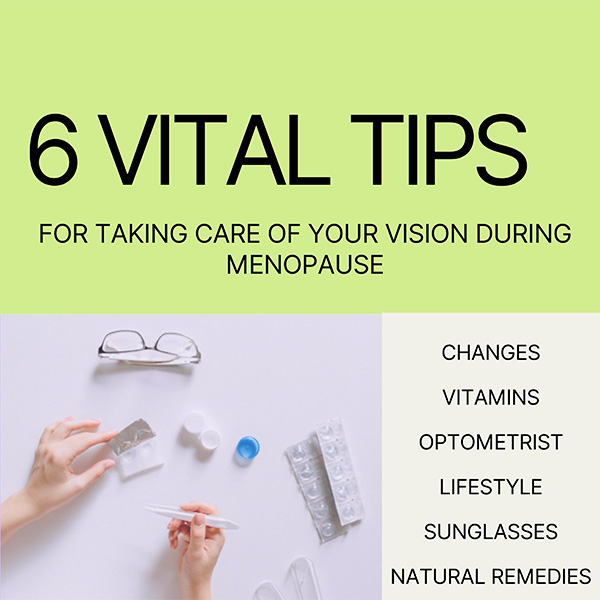Menopause is a significant milestone for women, bringing about many changes to the body. One of these changes is to the eyes and vision, which can have a considerable impact on daily life. Here are some helpful tips for taking care of your vision during menopause.
Understand the changes to vision during menopause
Women going through menopause may experience a range of vision changes, including dry eyes, blurry vision, light sensitivity, and even cataracts. These changes can be caused by hormonal fluctuations that affect the tear film and the lens of the eye.
Knowing what to expect, especially the relation between menopause and cataracts, can help women take better care of their eyes during this time.
Wear sunglasses when outdoors
During menopause, it’s important to take care of all aspects of your health, including your vision. One simple tip for doing so is to wear sunglasses whenever you’re outside. This is because exposure to UV radiation can cause damage to your eyes, leading to issues like cataracts and macular degeneration.
By blocking out these harmful rays, sunglasses can help protect your eyes and keep them healthy. Plus, they’re a stylish accessory that can add a fun and functional touch to any outfit! So next time you’re headed outside on a sunny day, be sure to grab a pair of shades and give your eyes the protection they deserve.
Increase your intake of vitamin A rich foods
Taking care of your vision during menopause is essential for maintaining good eye health. As estrogen levels decline, it can lead to dry eyes, blurry vision, and even cataracts. Fortunately, there are steps you can take to protect your eyesight. One such measure is to increase your intake of vitamin A-rich foods.
Vitamin A is an important nutrient for eye health, as it helps maintain the cornea, the outer layer of the eye. Foods rich in vitamin A include carrots, sweet potatoes, spinach, broccoli, apricots, and mangoes.
Adding these fruits and vegetables to your diet can help keep your eyes healthy and vibrant, even during menopause. Remember, prevention is key when it comes to taking care of your vision, so start incorporating vitamin A-rich foods into your diet today!
Visit an optometrist regularly
Regular eye exams are crucial for detecting and treating eye problems before they become serious. Women going through menopause should schedule comprehensive eye exams (which includes checking for cataracts) with their optometrist every year.
Early detection and treatment can help preserve vision and prevent more serious eye problems from developing.
Maintain a healthy lifestyle
Maintaining a healthy lifestyle is essential for overall health as well as eye health. Eating a nutritious diet, getting enough sleep, and exercising regularly can help reduce the risk of developing eye problems.
Additionally, smoking can increase the risk of cataracts and other eye problems, so quitting smoking is also recommended.
Try some natural remedies
Natural remedies can help alleviate some of the discomfort associated with menopausal vision changes. Using warm compresses to relieve dry eyes, and using artificial tears or eye drops to reduce redness and irritation are some natural remedies to try.
However, it is essential to consult with an optometrist before using any new products.







Speak Your Mind